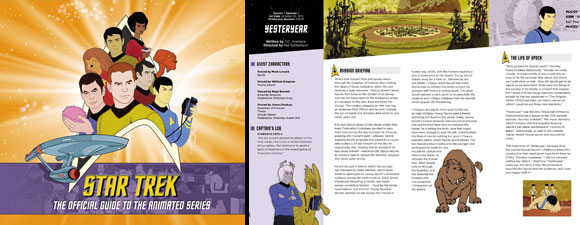Retro Review: Yesteryear
5 min readSpock must travel back in time to save his younger self from dying during a Vulcan maturity ritual.
Plot Summary: During a visit to the Guardian of Forever, Kirk and Spock discover that no one on the Enterprise remembers Spock except the members of their away team. With the help of the current first officer, an Andorian named Thelin, Spock consults Starfleet records and learns that Ambassador Sarek’s son Spock died at the age of seven during a Vulcan coming-of-age ritual. Because Spock was inside the time vortex, his adult self did not disappear, but because of the change in the timeline, his mother has died as well, which even Thelin believes is a reason for Spock to travel back in time and repair history. Spock recalls that a cousin named Selek saved his life during the kahs-wan ritual and guesses that he was himself that cousin. He follows young Spock into the desert, where the boy is struggling with his emotional human heritage and his father’s wish that he become a more logical Vulcan adult. A dragon-like le-matya attacks Spock, who is saved by “Selek” and his pet sehlat I-Chaya, but the animal is badly injured. Young Spock braves the desert’s threats to bring a healer, but the man tells him that if he keeps I-Chaya’s alive, the animal will suffer great pain. The boy makes the logical decision to spare I-Chaya that agony and lets his pet die. When Sarek thanks Selek for saving young Spock’s life, the adult Spock asks his father to try to understand his son in the future. Spock then returns to the future, where the timeline has been restored.
Analysis: “Yesteryear” is probably the most famous of the animated episodes – it’s certainly the episode that seems most memorable to fans, and even inspired a scene in the reboot Star Trek film in which young Spock gets into trouble similarly for fighting with his peers. I know that much of the animated series is not considered Star Trek canon, but many elements of “Yesteryear” turn up in later Vulcan lore, even Spock’s mother’s maiden name, and the story fits in perfectly with what we know about Spock and Sarek in the continuum stretching from “Journey to Babel” to Star Trek III: The Search For Spock. So much is packed into the less-than-30-minute running time of this animated episode that it’s hard to believe it’s as brief as it is, which is not to say that it drags: it simply contains none of the filler that so often occurs in hour-long Trek episodes, no gratuitous subplots nor attempts to give lines to characters not directly related to the storyline. It’s really a perfectly polished gem by D.C. Fontana, who wrote some of the most delightful episodes of the original series.
Oddly, though it’s very obvious that the time travel device is the Guardian from “The City on the Edge of Forever,” Kirk never calls it that in the version of “Yesteryear” on the DVD, and now I can’t remember whether he ever did. (I know that writer Harlan Ellison has complained about the use of his creation without compensation in various Trek novels, but Paramount owns the elements of that story, so he couldn’t have stopped them from using the Guardian again, could he?) Instead, Kirk says that the Enterprise is in orbit around the planet of the time vortex that is the focus of all the timelines in the galaxy. The similarities to Ellison’s episode begin almost immediately; no sooner does Kirk talk about how even tiny changes can alter all of history than Spock comes through the Guardian and McCoy doesn’t know who he is. It’s a lovely tribute to long-term character development that Spock believes it’s a practical joke on McCoy’s part and then Scotty’s before it becomes obvious that they’re not kidding. (The ribbing at the end, when Spock warns McCoy that if times were different, he might have to set his instruments for an Andorian, reminds me of “Amok Time,” only in this case McCoy actually has to remind Spock that Vulcans don’t joke.)
One would have thought that, given how much focus Spock got in the original series in the aforementioned “Journey To Babel,” “Amok Time,” plus “This Side of Paradise,” “The Menagerie,” etc., there wouldn’t be that much more to be contributed about his development. Yet “Yesteryear” takes a throwaway line from the first of these in which Amanda tells McCoy that Spock was fond of his sehlat (“a teddy bear?”) and spins a moving tale of parental expectation and youthful bravado. The elder Spock is surprised by the beauty of his home on Vulcan and sympathetic to the plight of his younger self being picked on as an Earther; despite many years of strained relations with Sarek, he is not judgmental of his father’s choices, nor the pressure Sarek puts on the young Spock, even though the adult Spock knows that that pressure to be a perfect Vulcan will cost Spock his life if “Selek” doesn’t intervene.
The scenes between the adult Spock and his youthful self are rather sad; how awful that the boy doesn’t have anyone who understands him except himself, how did Spock bear it before he met Kirk? He must even give up his beloved pet in this version of history, though it seems we are expected to believe that that loss actually makes the young Spock (and by extension the adult Spock) stronger, more willing to understand why he would wish to choose a logical response to an emotional one.
I must add, though that Sarek’s insistence that his son be more Vulcan than Vulcans has always irritated me – here, in “Journey To Babel,” and in the Star Trek: The Next Generation episodes involving the characters, who are once again estranged. For Sarek to marry not one but two human women, all the while insisting that his son must choose the path of logic over the path of emotion, seems pretty hypocritical. It’s delightful that Mark Lenard plays Sarek in “Yesteryear” as in “Journey To Babel,” though somewhat distracting that Majel Barrett plays both a Starfleet researcher and Amanda; her voice is impossible to mistake for anyone else’s. (James Doohan plays pretty much every other male character in the episode, but does a wider range of vocal registers and accents, though I’m afraid Doohan’s Guardian voice isn’t as impressive as the original.)
As for the one major new character, I am sorry that this is the first and last time we see Thelin, who is willing to give up his position to save a human woman he has never met. We never learn much about Andorians, but in an episode about the significance of family loyalties, this one proves to be the most honorable of the species.






